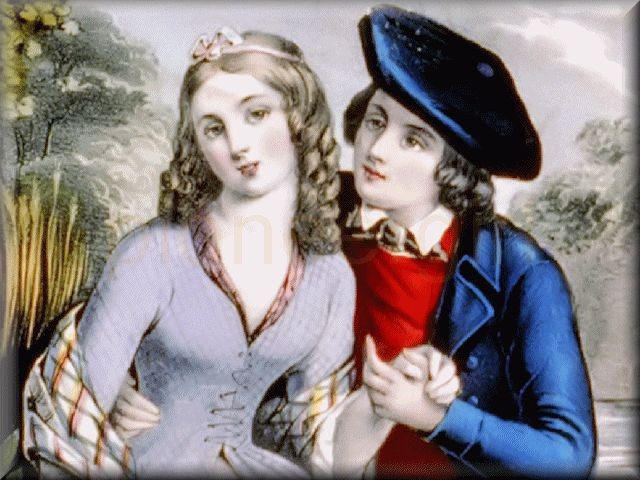“Highland Mary”

 He looked at Mary sitting quietly with beautiful empty eyes and folded hands in her rocking chair by the oven. ‘What shall I play for you, Mary?’…– By the Shores of Silver Lake, Chapter 15, “The Last Man Out”
He looked at Mary sitting quietly with beautiful empty eyes and folded hands in her rocking chair by the oven. ‘What shall I play for you, Mary?’…– By the Shores of Silver Lake, Chapter 15, “The Last Man Out”
 She brought him the fiddle box and he tuned the fiddle and rosined the bow. ‘What shall I play?’ – ‘Play Mary’s song first,’ Laura answered. ‘Perhaps she is thinking of us.’ — These Happy Golden Years, Chapter 25, “The Night Before Christmas”
She brought him the fiddle box and he tuned the fiddle and rosined the bow. ‘What shall I play?’ – ‘Play Mary’s song first,’ Laura answered. ‘Perhaps she is thinking of us.’ — These Happy Golden Years, Chapter 25, “The Night Before Christmas”
 ‘Play for Mary first,’ Laura answered. ‘And then play all the old tunes, one after another, as long as you can.’ — These Happy Golden Years, Chapter 32, “‘Haste to the Wedding'”
‘Play for Mary first,’ Laura answered. ‘And then play all the old tunes, one after another, as long as you can.’ — These Happy Golden Years, Chapter 32, “‘Haste to the Wedding'”
Highland Mary was written by Robert Burns in 1799 to a traditional Scottish tune, “Katharine Ogie.” The “Mary” from the song was Mary Campbell (1763-1786), a women with whom Robert Burns fathered a child. Mary Campbell became ill with typhus and died.
Robert Burns (1759-1796) was born near Ayr, Scotland, the son of a poor farmer. As a teenager, “Rabbie” began writing verses in Scots dialect and received recognition for his writing. He unsuccessfully labored as a farmer until circumstances (he fathered at least nine children by five different women) made him decide to move to Jamaica. In order to secure money for the trip, he published a book of his verses at Kilmarnock in 1786. It was so highly regarded that he was asked to come to Edinburgh and publish another edition of the work.
This was the turning point in Burns’ life. In Edinburgh, he was among society, riches, and learning, and both his poetry and conversational skills were much in demand. Hard work and hard drink led to health problems, however, and he died at age 37. Today, Burns is the Official Bard (poet) of Scotland, and on his January 25th birthday each year, Scots around the world celebrate with a Burns Night Supper.
Mary Ingalls was such a fan of Robert Burns that at her graduation from the Iowa College for the Blind, she recited an essay on Burns, “Bide a Wee and Dinna Weary.” In the Little House books, “Highland Mary” is Mary Ingalls’ song; it is the one she requests Pa to play and the song Laura asks to hear when thinking of the absent Mary.
(by Robert Burns)
Ye banks, and braes, and streams around
The castle o’ Montgomery,
Green be your woods, and fair your flowers,
Your waters never drumlie!
There Simmer first unfald her robes,
And there the langest tarry:
For there I took the last Fareweel
O’my sweet Highland Mary.
How sweetly bloom’d the gay, green birk,
How rich the hawthorn’s blossom;
As underneath their fragrant shade,
I clasp’d her to my bosom!
The golden Hours, on angel wings,
Flew o’er me and my Dearie;
For dear to me as light and life
Was my sweet Highland Mary.
Wi’ mony a vow, and lock’d embrace,
Our parting was fu’tender;
And pledging aft to meet again,
We tore oursels asunder:
But Oh, fell Death’s untimely frost,
That nipt my Flower sae early!
Now green’s the sod, and cauld’s the clay,
That wraps my Highland Mary!
0 pale, pale now, those rosy lips
I aft hae kiss’d sae fondly!
And clos’d for ay, the sparkling glance,
That dwalt on me sae kindly!
And mouldering now in silent dust,
That heart that lo’ed me dearly!
But still within my bosom’s core
Shall live my Highland Mary.
(from By the Shores of Silver Lake)
How sweetly bloomed the gay, green birk,
How rich the hawthorn’s blossom,
As underneath their frgrant shade
I clasped her to my bosom.
The golden hours on angel wings
Flew o’er me and my dearie
For dear to me as light and life
Was my sweet Highland Mary!
HIGHLAND MARY
(from These Happy Golden Years, Chapter 25)
Ye banks and braes and streams around
The castle of Montgomery,
Green be your woods and fair your flowers,
Your waters never drumlie;
There summer first unfolds her robes
And there the langest tarry,
For there I took the last farweel
Of my sweet Highland Mary.
CLICK HERE to listen.

“Highland Mary” (SSL 15; THGY 25, 32)
“How sweetly bloomed the gay, green birk”
“Ye banks and braes and streams around the castle of Montgomery”



